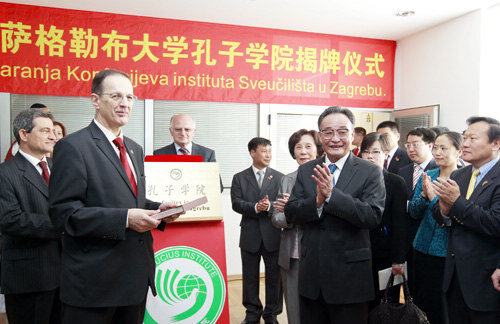|
 |
|
CULTURAL UNDERSTANDING: Wu Bangguo, Chairman of the Standing Committee of the National People's Congress, China's top legislature, attends the opening ceremony of the Confucius Institute of the University of Zagreb in Croatia on May 19 (JU PENG) |

In the long history of their relationship, China and Europe experienced both friendly exchanges as evidenced by the 13th century travelogue, The Travels of Marco Polo, and tragic memories such as the Opium Wars in the mid-19th century. The time-honored relationship has gone through dramatic changes over the past several decades. While China forges ahead with its reform and opening-up program, European integration is creating a new Europe.
Given their geographic distance, there are no direct geopolitical conflicts between China and Europe. Moreover, flourishing economic and trade relations and strategic cooperation have made them increasingly interdependent. These characteristics have shaped past and current Sino-EU relations, and will continue to shape the relations in the future.
Evolving perceptions
China's policy on Europe is based on its judgment of the overall international situation and its perception of Europe. In Chairman Mao Zedong's theory, Europe was seen as part of the Second World, while the two superpowers, the United States and the Soviet Union, were called the First World. The Chinese Government regarded Europe as a major role model when it adopted the reform and opening-up policy in the late 1970s. At the beginning of the 21st century, China and the EU established a strategic partnership. Europe has constantly held an important position in China's foreign relations.
But due to differences between China and Europe in terms of the level of development and the deep-rooted superiority complex stemming from Eurocentrism, some European politicians and opinion leaders have long regarded China as problematic. As a result, problems caused by misunderstandings between the two sides concerning trade, market access, intellectual property rights protection, human rights and Tibet often take a toll on Sino-European relations. Critics from both sides said the Sino-EU strategic partnership is neither strategic nor a partnership. Under such circumstances, China has consistently adhered to a policy of increasing mutual trust with Europe. It has ensured the stable development of Sino-EU relations as it pursues equal dialogue and mutually beneficial cooperation with European countries.
With the steady rise of China's national strength and international influence, especially in the context of the severe global financial crisis and European debt crisis, the basis of Sino-European relations is changing gradually. In the eantime, changes are taking place in Europe's erception of China. As European scholars said, it was totally unimaginable to expect China to bail out Europe five years ago. But now, Europe has begun to believe China is a responsible strategic partner and an important problem-solver. China and Europe are opening a new chapter in their cooperation and dialogue.
New start
The flow of capital, technology and industry brought by globalization has resulted in high interdependence between China and Europe. There is no doubt that the intimate economic and trade relationship is the basis and impetus of Sino-European relations. Due to the complimentary nature of their industrial structures, China and Europe find the most common interests in economic and trade cooperation.
|
